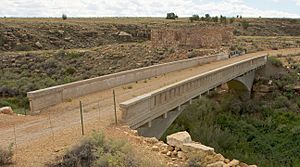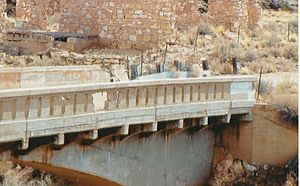Canyon Diablo Bridge facts for kids
Quick facts for kids Canyon Diablo Bridge |
|
|---|---|
 |
|
| Coordinates | 35°6′56.46″N 111°5′44.24″W / 35.1156833°N 111.0956222°W |
| Carries | Vehicles |
| Crosses | Canyon Diablo |
| Locale | Two Guns, Arizona, United States |
| Characteristics | |
| Design | Reinforced concrete Luten arch with cantilevered roadway |
| Total length | 146 ft (45 m) |
| History | |
| Construction begin | Winter 1914-15 |
| Opened | March 17, 1915 |
| Closed | 1938 |
|
Canyon Diablo Bridge
|
|
| Lua error in Module:Location_map at line 420: attempt to index field 'wikibase' (a nil value). | |
| Architect | Topeka Bridge & Iron Co. Thomas Maddock |
| MPS | Vehicular Bridges in Arizona |
| NRHP reference No. | 88001664 |
| Added to NRHP | September 30, 1988 |
The Canyon Diablo Bridge is an old, unused bridge in Coconino County, Arizona, USA. It's about 30 miles (48 km) east of Flagstaff, Arizona. This bridge used to carry Route 66, a famous highway, across a deep ditch called Canyon Diablo. Near the bridge is the ghost town of Two Guns, which was once a busy place for travelers.
Contents
Building the Bridge
For a long time, people found it hard to cross Canyon Diablo. In the mid-1800s, settlers used wagons to zig-zag down the canyon walls. They would then cross the dry riverbed at a spot near what is now Two Guns.
Planning the Design
In 1914, a new bridge was built about 19 miles (31 km) west of Two Guns. That same year, Arizona's state engineer, Lamar Cobb, decided to build a bridge at the Two Guns location. He bought plans for $500 from the Topeka Bridge & Iron Co..
The company designed a special type of bridge called a Luten arch. This design used reinforced concrete and had a roadway that stuck out over the sides, called a cantilever. The bridge was planned to be 128 feet (39 m) long.
Building for Floods
Sometimes, water would rush through Canyon Diablo, causing floods. To protect the bridge, the designers made the upstream wall (the side facing where the water would come from) solid. The downstream wall (the side where the water would flow away) had slots cut into it. This design helped protect the road from strong floodwaters.
Construction and Opening
The job to build the bridge was given to Thomas Haddock of Williams, Arizona in late 1914. He was the lowest bidder at $9,000. The state provided the concrete and steel needed for the bridge.
Construction happened during the winter. On March 17, 1915, the Canyon Diablo Bridge officially opened.
Bridge's Life and Legacy
When it first opened, the Canyon Diablo Bridge was part of the National Old Trails Road. This road was also known as the Santa Fe Highway in Arizona.
Becoming Part of Route 66
In 1926, the National Old Trails Road became part of the famous U.S. Route 66. This meant the Canyon Diablo Bridge was an important link on one of America's most well-known highways.
Replaced and Remembered
The bridge was used for many years. However, in 1938, a new bridge was built just north of the Canyon Diablo Bridge. After that, Route 66 (and later Interstate 40) used the new bridge. The old Canyon Diablo Bridge was no longer needed for traffic.
Even though it's no longer in use, the Canyon Diablo Bridge is still important. In 1988, it was added to the National Register of Historic Places. This means it's recognized as a special historical landmark.
 | James B. Knighten |
 | Azellia White |
 | Willa Brown |


